Men We Love: Reel Rock Founder Peter Mortimer
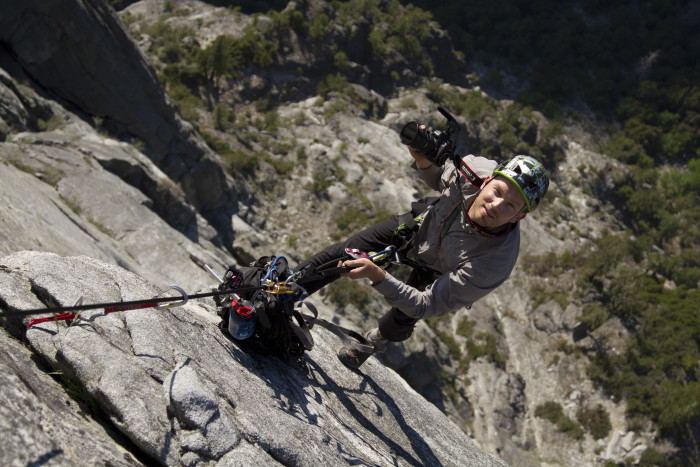
Sixteen years ago, Reel Rock Founder and Filmmaker Peter Mortimer solo-produced his first climbing feature, “Scary Faces,” in Eldorado Canyon, which kicked off his company, Sender Films. Today, his one-man show has climbed countless pitches—and spun into a collaborative showcase that inspires audiences worldwide.
After a destined team-up with Big UP Productions Founder Josh Lowell—the two friends met in college—the companies founded Reel Rock in 2006: a climbing and adventure film tour based on gelling community, enhancing respect for the outdoors, and stoking adventure.
Now, Reel Rock screens more than 500 shows globally. All the while, the Sender and Big UP duo has landed other major side projects, expanding as a creative agency—like creating content for the Google Street View team. They’ve produced 27 episodes for the Red Bull TV series: seven more are on the roster. And a bevy of awards and nominations, including the multi-award winning documentary, “Honnold 3.0.”
Not mention, raising a family with two little ones, in his hometown, Boulder, CO.
Here, Womens Movement caught up with Mortimer on the evolution of his career, tips for novice filmmakers, and why climbing stories never get old.
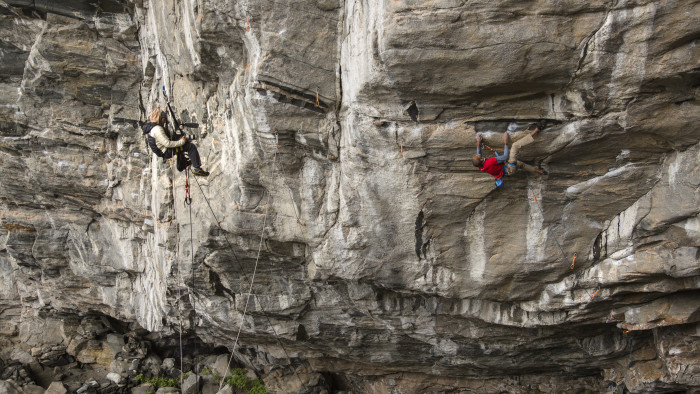
WM: How has your role in the overall film production evolved over time?
Peter Mortimer: When I created “Scary Faces,” I did everything. The digital age was starting and the prices had come down. I bought a small camera, a little editing system. And a 22-gigabyte hard drive—which cost $1K! The crazy thing is that all of my media for the entire film fit on there, because the file sizes were so much smaller. It’s amazing how all of that has changed. I still have that hard drive as a shrine!
Now, we’ve merged Sender Films with Josh Lowell’s Big UP Productions. We have 15 to 20 full-time employees between both companies. Now, I don’t do much producing and don’t shoot at all—I don’t even know how to run the cameras that we use! We hire amazing people to do producing, editing and shooting who are way better at it than I.
I work on the business and storytelling sides. Crafting the stories, and the development: raising money for the films, working with the team to develop ideas, brainstorming how to distribute, and working each project into the overall plan.
WM: Teamwork seems to be the key ingredient of your creative process.
Peter: I’m totally into one and one makes three. That is the founding principal of Reel Rock.
Josh and I went to college together, were both geology majors, and were always checking in on each other. We had been doing our own climbing films and the work was so hard—filming, fundraising and distribution.
And we had our own niches. His was super high-end: what’s Chris Sharma doing. Mine was quirky characters, storytelling, the lifestyle. Then we had this conversation and decided, let’s create a tour to bring the films together and pool our sponsorship funds. It was such a no-brainer to combine.
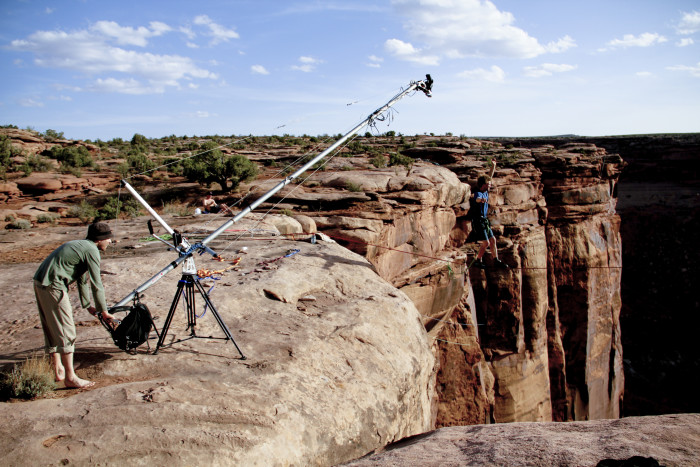
WM: Did you ever imagine that Reel Rock would grow to be so huge?
Peter: We always had this model in mind that the growth was going to be organic and community based—that’s how we built our following before Reel Rock. We just wanted to keep that going, and to make the best content. We’ve never done advertising.
On the other hand, the climbing world has expanded so much since we started doing this. When we started working with The North Face they did 5 or 6 million in sales. Now, they are at 2 billion. Climbing gyms has totally changed the sport and opened it up to different locations, ages, and made it more diverse. The [Reel Rock] program needs to be for non-climbers, people that are top roping 5A in the gym, as well as core climbers.
We are absolutely lucky to be doing this as the change is happening. It’s pure luck. If we were in the ski industry, for instance, we probably wouldn’t have been able to ride a wave like this.
WM: What does your average workday look like?
Peter: The best thing about what I do is that it changes—a lot. And whatever you do, you do it on super overdrive, but you know you won’t be doing the same thing in two months.
We are finishing up the Dawn Wall film that’s coming out next year, so this summer I have not been in a total creative headspace, trying to crack the big creative nuts. I have my computer and one editor who I work with. I can’t answer emails or sleep at night. I’m editing my dreams.
It gets crazy but you know that the end is near. By September 15—when we have the Reel Rock premiere—I won’t step into the editing room for two months. I’ll be out of the cocoon, going to festivals, talking to people, and thinking about the next round of projects.
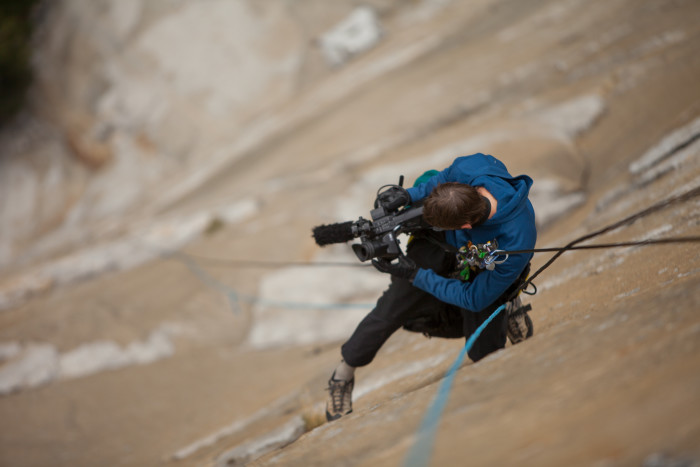
WM: With a family and sprinting work schedule how do you maintain a work-life balance?
Peter: I climb much less than I used to. Living in Boulder, climbing is much easier to access, so I can get out for a couple of hours here and there or at lunch. I do just enough to maintain but certainly not like when I was in my twenties or early thirties.
All of us in the outdoor industry can commiserate that you initially get into your work because you love the lifestyle. You want to climb, live a flexible life where you’re not working a 9-to-5 job, and you have the freedom to do the stuff you’re passionate about—I don’t know anyone that maintains that. Running your own business is all-consuming and being passionate makes it worse, because you really care and all of your friends will see or buy your products. It’s a catch-22.
I spend a lot of time with my kids, but like anyone I wish I could spend even more! Living in a smaller town with access to the outdoors and a family-based community makes everything much easier. If I were living in L.A. or New York and working as much as I do, I would not see my family as much.
WM: How do you keep the storytelling material fresh?
Peter: After all of these years of doing climbing stories we’re having this explosion of bigger, better stories. It’s a testament to how rich the climbing world is for storytelling: the idea of having crazy objectives and getting to the top is so relatable. The competition, relationships—you can find so many variations.
We constantly hear about ideas that are totally different than anything we’ve ever done. We have a list of 15 or 20 films that have been pitched to us.
The biggest side is the evolution of the climbers themselves. Reel Rock has these go-to characters you see over and over again. When Alex Honnold first appeared on “Alone on the Wall,” he was punk, was a terrible interviewer, was reading Ayn Rand, and was like, “Why would anyone use a rope? You guys are pussys.”
He was so agro. Now, he’s so well spoken, deep, thinks about things so much, and cares about his relationships. Then there are the the new faces of badass climbers who are not even known in the climbing world, like Brette Harrington. She’s a free soloist and puts up hard trad (read: traditional) first ascents.
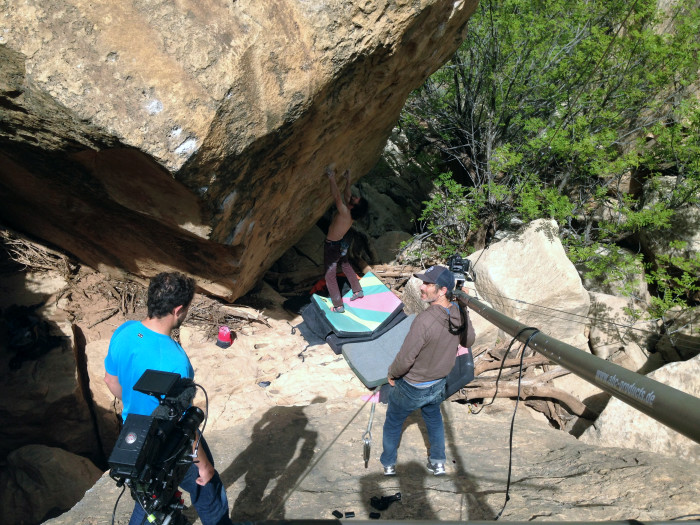
WM: What advice can you offer to amateur filmmakers who want to start documenting their stories?
Peter: One of the big changes happening in the outdoor world is that people are recognizing the value of documentaries as opposed to sports action. Now, you can YouTube a really hard climb and understand what 5.15 means.
If you’re going to be a filmmaker, it needs to be about something else: the character, dream, passion.
In “A Line Across the Sky,” Alex and Tommy only pulled the camera out when they were at belay. The feeling of what it was like for them on the climb is told in the way that they communicate with each other: it’s not how they move across the rock. That’s thinking like a documentary filmmaker.
Making a documentary means capturing personalities, behind the scenes, the drama. Keep the camera rolling.
If you have an amazing character or objective, don’t go towards the sunset shot or slow motion walking: that’s not going to make the film amazing. Real moments of angst make it amazing.
And find the right people to collaborate with. Doing it alone limits the scope of what you can do. I think you can achieve so much more, and make projects bigger and broader by letting go of the auteur philosophy.
People are so good now about partnering to make their projects better, but it didn’t used to be that way. People used to hold things close to their chest. That does still happen but it’s harder and more rare.
The 11th annual Reel Rock film tour launches this fall. Don’t miss a screening near you.


LET'S GET SOCIAL